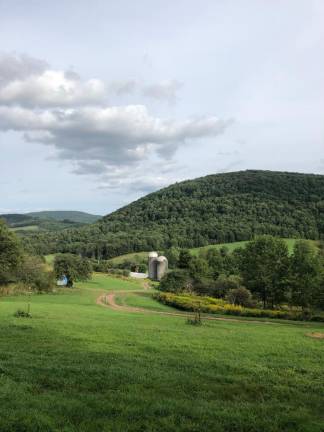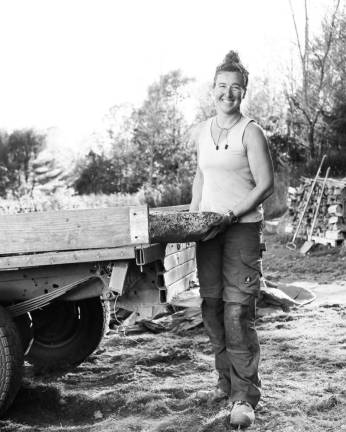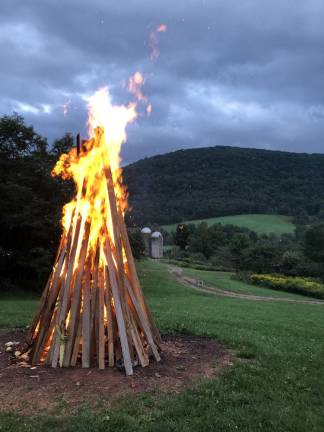When city folk go rural
A recent transplant wonders: What will a post-pandemic urban exodus mean for upstate locals?



It’s not a new phenomenon. People who have urban centered lives have always sought to balance that out by escaping to the country. A few free hours for a drive and a hike can easily turn into a splurge at a crappy motel to buy just a little more time in the trees and maybe find a swimming hole. The deep relief that the country brings feels like an absolute necessity to anyone whose only access to private outdoor space could be climbing out the window to sit on a fire escape. The lucky ones hop in their cars, endure the hour it takes to get out of the city in traffic and head North. The really lucky ones have vacation rentals where they can stay and enjoy the trees for a little longer. The really, really lucky ones buy a second home in one of these places, to unwind and settle whenever they get some time. And then there are the city transplants, who fall so deeply in love with the slow and still that it calls them to make a massive shift. Some can telecommute to the same job. Most spend a long time agonizing over a negotiation between lives until they are finally forced to find a way to reinvent themselves rural. Some come out to fulfill their dreams to farm. Some open restaurants, or coffee shops, or boutiques. These urban transplants, upon finding one another, tend to share a common and strong bond. They all are so intensely besotted by this place that they chose to risk what they were used to and find a new way. You have to be willing to learn something new. Be a fish out of water till you slowly learn how to swim again. These are not people in their twenties, generally. They are people in their thirties, forties... when a whim like that is a thing of the past and you have to go all in.
The dream
You buy an old farmhouse, its battered shutters hanging onto the siding by a thread. The shelving inside the cabinets that has been eaten away by mice. The square of flooring that’s a different shade from a half century of having the same rug in the same place. You love it, you choose it. You take it all in, even as you sleep. But with a town, a community – you have to look harder to see. You have to choose to breathe with it.
When I made my venture into the Great Western Catskills going on two years ago, I assumed that there would be no one like me. Maybe that’s normal when you make a big move. For some reason we so often assume that we won’t find our people. Like we’re hardwired to see so many differences instead of similarities. It feels impossible to get past cultural differences to true heart. And connection is all anyone is really looking for, right? Does that have to start with commonality? It certainly helps, but maybe we search for connection in a way that’s far too on-the-nose and it would behoove us to take a more circuitous route.
As city folk like me get out of Dodge in the wake of the pandemic, buying up real estate sometimes sight unseen, what obligations do we have to the community where we end up? And what will it mean for these small upstate towns?
The pros: diversity, resources and a good cappuccino
Jane DeWitt grew up in Delaware County, NY. Her father is from here and her mother is from the city. “But you’d never know it,” she says of her mom. “At this point she’s as local as it gets.” She makes strong, lumbering gestures with her arms and body to demonstrate her mother’s rural disposition. After graduating high school, Jane went on to college at Dartmouth. She majored in English and creative writing, but she eventually decided that those things would pull her too far in another direction.
“I love this landscape, and my mother, and physical work.” So when DeWitt returned to the area, she started a business as a stone mason. I heard about DeWitt shortly after I moved here and started looking for someone to fix the partially finished chimney that came with my house (among other hacked together repairs or “renovations,” my lifelong Frankenstein-muse with twelve fingers and webbed toes.) Every person I asked for a recommendation, all said Jane. She is talented. She is hard working. She is professional and her reputation is peerless.
I ask DeWitt if she worries about an influx of people (like me) coming into her community.
“I love diversity,” she said. We are sitting in the sunlight of her living room, in the house that her friends built her on some of her parent’s land. “This isn’t a new thing. Everybody is new here at some point. Unless you’re a Native American Iroquois, you came here.” It amazes her that she can get on her bike and get a cappuccino in the town of Bloomville, or drive to Franklin and have a Turkish brunch at The Tulip and the Rose. But she still wants a hardware store, an agriculture store in her community. A mix. “That’s richness,” she said.
A surge in full-time residents from places where telecommuting is viable might be exciting. More people with resources to care and contribute in a place where there’s not a lot of industry.
As they put down upstate roots, savvy New Yorkers could turn out to be a political force, pushing for better schools or expanding broadband coverage into the far reaches of upstate towns that still don’t have it. “As a second home owner, you kind of don’t have time to be politically active,” said Chuck Petersheim, owner of Catskill Farms, which caters to city dwellers looking for homes in Ulster, Dutchess and Sullivan counties. “But if all of a sudden you are up there...”
DeWitt hopes, too, that living through a pandemic could open our eyes to the obvious realization that large scale farming is not advantageous to food security. That awareness would be a triumph for agricultural communities like these.
The cons: locals feel the squeeze
Carver Farrell, like DeWitt, grew up in this area has a business and apartment in the city as well as a house in Bovina, his hometown. Even before the pandemic-fueled northward migration, affordable housing in the area concerned him, as he watched upstate get ever trendier over the last five years. Now, he said, “People are afraid of losing what they’ve known all their lives.”
“For someone in the market from the city, 250k for a country home is a steal,” said Farrell. From the urban perspective, this is part of what instills so much inspiration: the financial freedom to be able to create what excites you. “But for people out here who might make a household income of 28k a year, they can’t possibly compete.”
Thanks to popular short term rental sites like Airbnb, there’s no downside to stockpiling “investment properties,” since anyone can almost effortlessly make income on a rental. For communities like mine, which is in one of the poorest counties in New York, the fallout is that the price of homes has gone up. This leaves young families that grew up here priced out of buying, and with no rental market in sight.
This squeeze has been compounded by the long, steady demise of independent dairy farming all over rural America. Bovina’s heyday saw 80 dairy farms. While Carver was growing up, he says there were around 30. “Now I’m pretty sure there are just two.” And so an already tenuous economy has become more and more reliant on tourism instead of agriculture. Into that landscape, city buyers show up with cash in hand, and Carver fears that the prospect of foreclosures looms large – a quick way for struggling locals to tide themselves over to better times.
“My biggest worry is that the pandemic is going to tip the scales in the wrong direction,” said Farrell.
“It’s shocking the people I know with multiple properties here,” said Heather Phelps-Lipton, communications director at The Catskill Center, a nonprofit focused on economic, environmental and cultural issues. “Like all the ‘haves’ can come in and consume everything, like Delaware County is just fodder to be consumed.” Phelps-Lipton traded a commercial loft in the city for a house in the upstate village of Delhi and her freelance photography hustle for a full-time job. She moved to the village because she wanted a social experience instead of being isolated somewhere on the side of a mountain. She’s found that archetypal village life in friendly neighbors, baked goods and wine left on her front porch, the offer of the use of one man’s car any time she needed it, keys always inside.
Notwithstanding her warm welcome, Phelps-Lipton has observed the ever so subtle city-local cultural divide that I’ve noticed as well in my time here. Or maybe not a divide as much as a formality or lack of comfort. But not just in a middle school dance kind of way. With some real tension that has meaning behind it. My observation of it comes with a frustration with having to be a sort of foreigner in a new land, a guest in someone else’s home. And the locals may not be wrong to suspect us newcomers of harboring a propensity to think we know a better way.
Phelps-Lipton tells the story of going to a dinner party where a couple complained about how people shouldn’t be allowed to keep their children’s plastic toys in their yards. It’s an absurd comment, but it does highlight a common human instinct to try to transform things into your own image, instead of shifting to accommodate what’s in front of you.
What does it mean, then, to be an ethical urban migrant to a rural place? There is no straightforward answer. Maybe it starts with putting a bit of effort and curiosity into the makeup of your community, having a sense of the ripple emanating out from you, however physically solitary you may be.